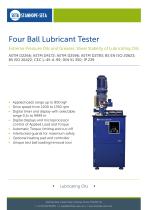
Friction tester Seta-Shell oilfor greasesfor lubricants

Add to favorites
Compare this product
Characteristics
- Test type
- friction
- Tested product
- oil, for greases, for lubricants
Description
The Autoload Seta-Shell Four Ball Lubricant Tester determines the friction properties of extreme pressure oils and greases. Used in tribology research laboratories and in the routine quality control of finished lubrication products.
A ball, mounted in a chuck, is rotated against three stationary balls in a pot containing the sample lubricant. The digital speed controller has three factory pre-programmed settings which are 1200, 1475 and 1760 rpm. A load, adjustable in the range of 6 to 800 kgF, is applied to the balls via a balance beam and electric jack. The applied load is displayed on a digital readout. The torque transferred between the rotating and stationary balls is measured and displayed. The digital timer, with a range of 0.1 seconds to 9999 hours, can be used to control the duration of the test. If the torque exceeds a preset level, or the balls weld, during a test, power to the drive motor is automatically turned off.
Features
• Drive speed from 1200 to 1760rpm
• Torque measurement and limiting
• Full Digital Control
• Digital displays of applied load, torque, time
• Safety splash guard
The optional Seta Wear Loading Kit (19940-0) allows the user to quickly convert the equipment into a Four Ball Wear Tester for ASTM D2266 and D4172 tests.
Supplied with;
1000 IP 239 test balls (ISO 683-17, ISO 3290-1 Grade G5)
Torque wrench with adjusting key and certificate of calibration
Instruction manual
SPEED RANGE: 1200 to 1760 rpm
LOAD RANGE: 6 to 800 kgF
TIMING: 0.1s to 9999 hr
VOLTAGE: 220/240 V, 50/60 Hz, 32 A (single phase)
POWER: 2.6 kW
SIZE (HXWXD): 165 x 82 x 62 cm
WEIGHT: 180 kg
CCCN CODE: Tariff 90319000
Catalogs
Four Ball Lubricant Tester
3 Pages
Related Searches
- Test machine
- Measuring device
- Automatic test machine
- Portable testing system
- Digital tester
- Digital measuring device
- Portable measuring device
- Viscosity measurement device
- Benchtop testing system
- Compact testing system
- Laboratory measuring device
- Hydrometer
- Laboratory viscometer
- Tester for automotive applications
- High-temperature testing machine
- Pressure measuring instrument
- Pressure testing system
- Tester for pharmaceutical applications
- Stability test machine
- Flash point tester
*Prices are pre-tax. They exclude delivery charges and customs duties and do not include additional charges for installation or activation options. Prices are indicative only and may vary by country, with changes to the cost of raw materials and exchange rates.


